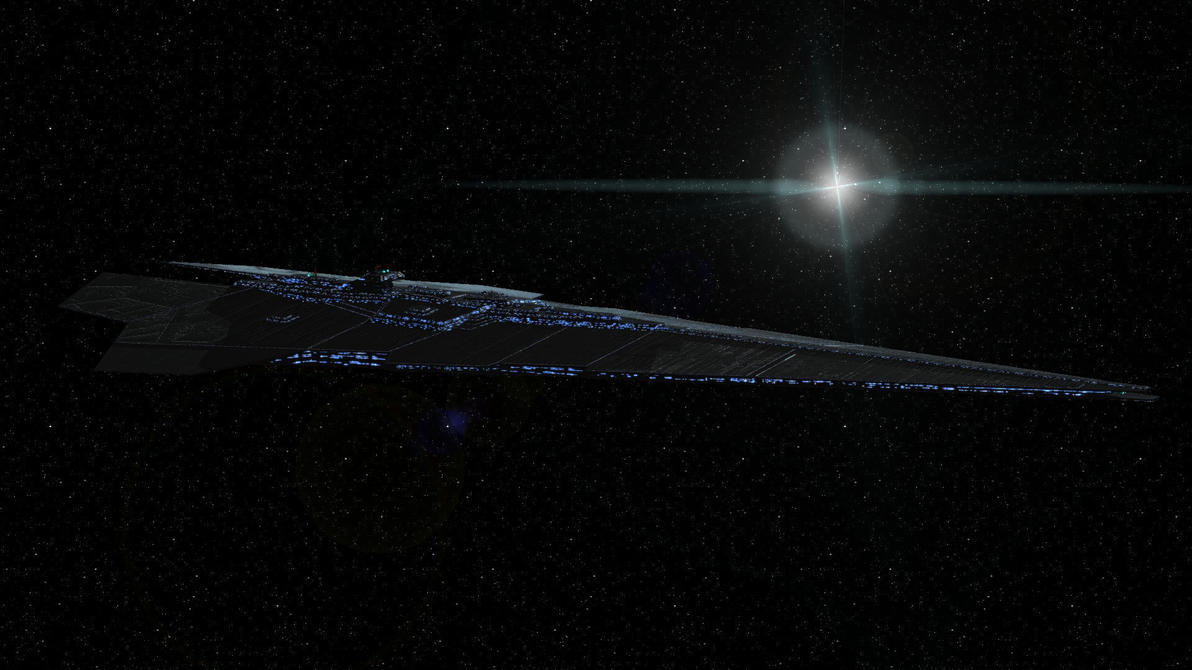Ashin Varanin
Professional Enabler

Image Source: DeviantArt, Vince-T, 'Sovereign Pure'
Chrysalide-class Battlecruiser
In cooperation with @Dranok Lussk.
Intent: To provide the Lords of the Fringe with a balanced vessel capable of seizing territory on its own or combined with fleet forces.
Development Thread: None. Combination of event reactor/capship tech (Brawl of the Dead) with event prize (4km permissible ship length from Final Countdown) and three sets of components secured during Final Countdown. These components are not necessarily equal, comparable, or even similar to the other components secured during the four phases of Dark Harvest.
Manufacturer: Iron Crown Productions, in consultation with Raider Defense Enterprises and Lussk Logistics
Model: Chrysalide-class
Affiliation: One Sith
Modularity: No
Production: Unique
Material:
Durasteel (hull, spaceframe, armor)
Glasteel (viewports)
Turadium (bridge, recessed shield generators)
Description:
However, this is not to say that the Chrysalide-class falls short in combat capability. Iron Crown has systematically ripped apart the Black Hex Star Destroyer secured at Elrood. Its advanced reactor and many of its other high-end components have been integrated into the Chrysalide-class, making this vessel the combination of ambitious size allowances and the most major prize of the Dark Harvest war. The integration of the Black Hex's technology, as well as the advanced components secured at Dagobah, permits the Chrysalide-class redundant shields and heavy firepower. The technology did not, however, grant the Black Hex's incredible speed in sublight or hyperspace: It was reoriented to power weapons and shields exclusively.
Aesthetically, the Chrysalide-class is a departure from earlier Fringe design sensibilities, and distinctive on any battlefield. Its organic angles and lines suggest the spine of a creature capable of breaking worlds. The protruding structures serve a practical purpose: They give quad laser cannons and flak batteries the vantage points necessary to fully defend the surface without falling victim to the increased tracking angles of a directly oncoming warhead.
Though the designers were educated in the galactic mainstream, they took inspiration from the older vessels common in the Unknown Regions. The most significant improvement over the mainstream was the substitution of flak cannons for point-defense laser batteries. As starship designers had understood in the late stages of the Clone Wars – a conflict more comprehensive than nearly anything in the modern era – a battlefield full of electronic countermeasures and highly maneuverable warheads posed problems for point-defense lasers. Against incoming warheads and the masses of tiny droid fighters fielded by the Ssi-Ruuvi Imperium, mass-driver flak cannons turned out to be superior. These flak cannons were fully capable of firing anti-capital ammunition and other variant rounds, amplifying the Chrysalide's primary firepower in desperate circumstances. However, anti-capital ammunition is not a cargo priority, meaning longer loading times and lesser available duration than flak ammunition.
The Chrysalide-class's hangar bays and bridge are defended by point-defense collision-aversion pressor beams, small pressor beams designed to redirect suicide runs or boarding attempts, or cause premature detonation in waves of warheads or Ssi-Ruuvi swarm droids. The pressor beams can normally redirect, slow, or stop most such attempts, for at least long enough that the quad lasers and point-defence batteries can handle the situation. The bridge has a low profile, and the flanking shield generators are heavily recessed. At the cost of higher power requirements -- a heavier load on the reactor – the shield generators can maintain a level of shield strength and resilience equal to non-recessed generators. Like the bridge, the generators are turadium-plated, allowing for a fractional but significant increase in protection over the normal durasteel. In a battlefield where suicidal, remote-controlled Ssi-Ruuvi combat units are a prime danger, these precautions are essential. To account for including these components inside the spaceframe, cargo space and passenger capacity have been drastically sacrificed.
The first and only Chrysalis-class vessel was placed under the command of Lord Admiral Dranok Lussk, the second most senior naval commander in the Fringe Confederation.
Classification: Battlecruiser
Role: Flagship
Height: 1,100m
Width: 900m
Length: 4,000m
Power Core Generator/Reactor: Solar Ionization Reactor
Hyperdrive Rating:
Class 1
Class 10 Backup
Optimal Crew: 55,000 + 3,000 Gunners + 100 F1 Field Medic Droids
Armaments:
Hellbore cannons (4 = 480 guns)
Hypervelocity cannon batteries (4 = 160 guns)
Heavy Quad Turbolaser Batteries (20 = 640 guns)
Turbolaser Batteries (100 = 400 guns)
Fastmount Heavy Turbolasers (100 = 200 guns)
Ion Cannon Batteries (30 = 120 guns)
Turreted Light Energy Torpedo Projectors (1000 = 480 + 520 (from 1040 guns))
B1-TM3 Antimissile Countermeasures Package (10 = 200 defense guns)
Quad Laser Cannons (200)
Antimissile Octets (160)
Flak Cannons (160)
Tractor Beam Projectors (10)
Gravity Well Projectors (2)
Point-defense collision-aversion pressor beams (10 starboard hangar, 10 port hangar, 10 bridge, detailed above)
Hangar:
Pandorum-class Gunships or Malos-class Gunships (96)
Detryte-class Bombers or Galaxy-class Bombers (72)
Hammer-class Dropships or Hammer-B LACs (42)
Pyrrhus-class Dropships or Defensor-class Anti-Missile Vessels (36)
Non-Combative Attachments:
Advanced Sensor Array
Advanced Targeting Systems
Standard Communications Array
Standard Navigational Systems
Standard Life Support Systems
Redundant Shield Generator Systems
Advanced Detention Cells, including three Universal Energy Cages
Advanced Encryption Network
Directed Energy Receptors
Ranger Transceiver
Escape Pods
Passenger Capacity: 6,000
Cargo Capacity: 30,000 metric tons
Consumables: 2 Years
Sublight Speed and Maneuverability: 8.5

